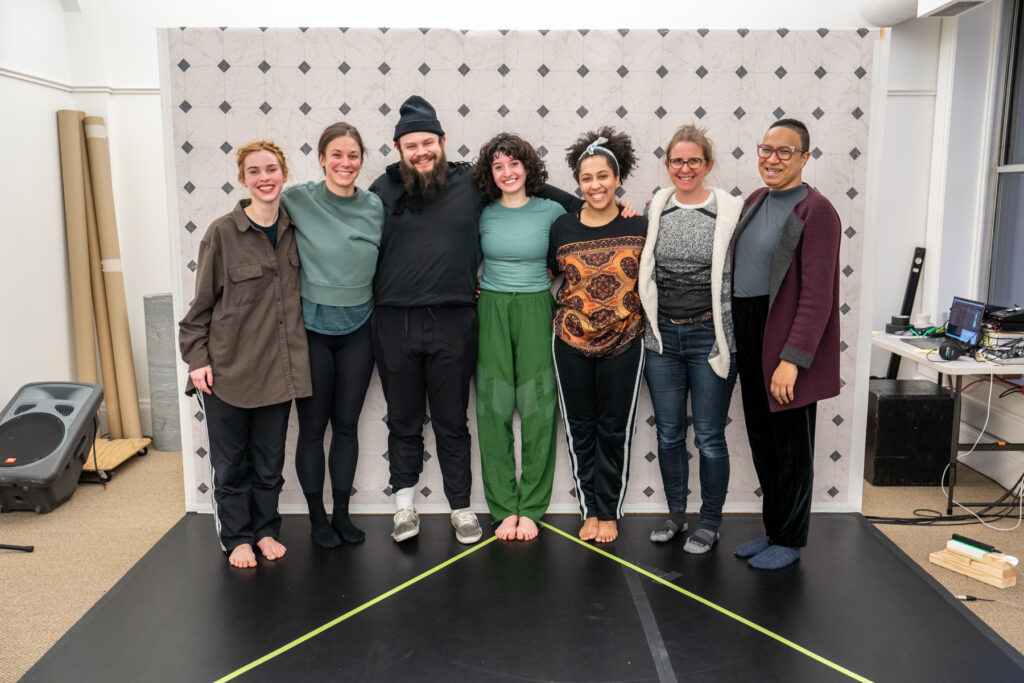On Truth and Disagreement
A conversation with choreographer Alexandra Bodnarchuk that takes feminism as a springboard: on agency and experience, when to claim and when to resist, and how to hold contradiction
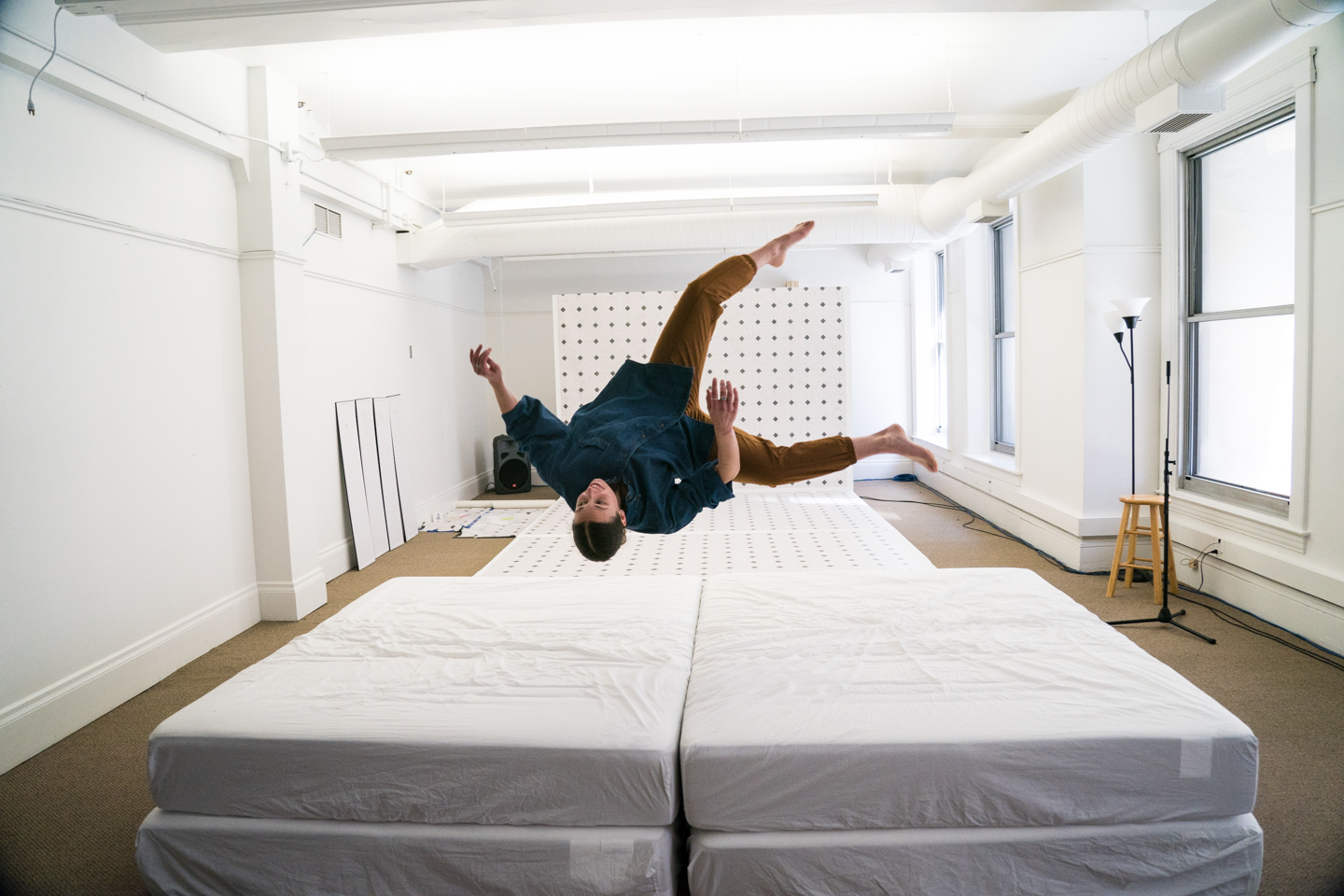
Last spring, choreographer Alexandra Bodnarchuk reached out to me about collaborating on her new project Rock, Paper, Scissors. I have since been working with her and the team as a co-director, dramaturg, and vocal coach. Ahead of the public sharing of this work, we sat down to discuss making, agency, being, and truth. Feminism is a springboard here, not a container. I have edited our conversation for length and clarity with an eye towards preserving non sequitur.
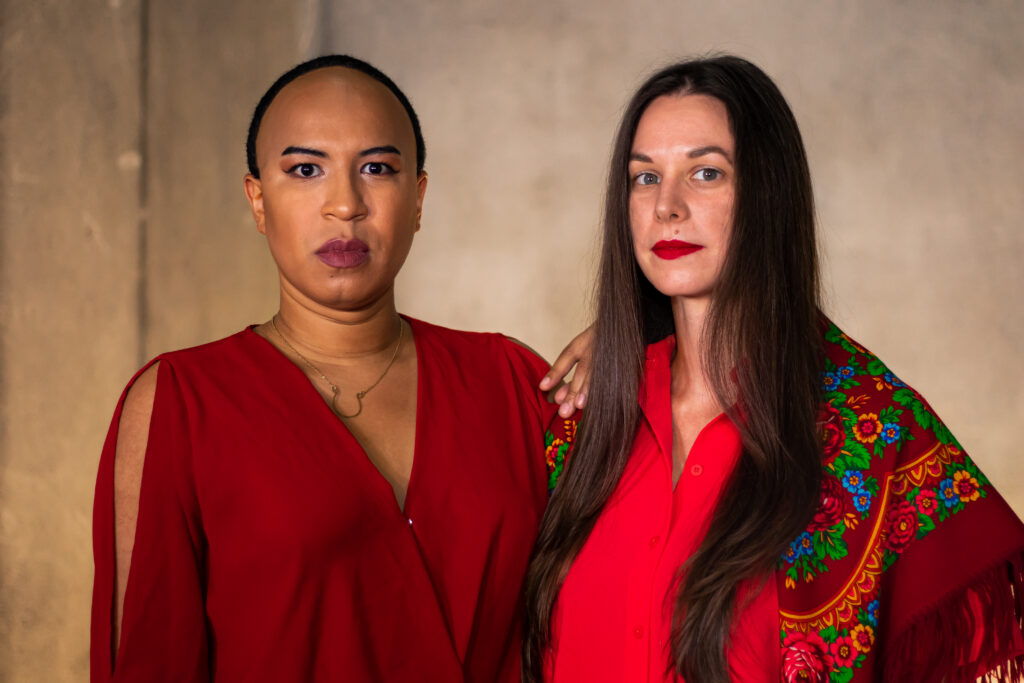
MARCELA MICHELLEOkay, here we go. We’re going to talk about feminism and identity-based making, specifically from the perspective of being women. Do you identify as a feminist?
Alexandra BodnarchukYeah, I identify as a feminist. My view on my place in the world as a woman is informed by my lived experiences and things that made me feel lesser-than, like my ballet teacher critiquing my forearm muscles. This is why, for such a long time, I’ve been interested in unpacking why I had an eating disorder. It relates to how I’m perceived in the world, without understanding what my body can unintentionally say. There’s so much history and so many social structures that define how I’m perceived. How do you identify?
MMI go back and forth. When I was younger I was really into being a girly girl, and there was like a burlesque/vintage-y reprise of that later. Then I was doing a genderqueer thing, and then I was really steeped in lesbian community. And so for a long time, that was a really important part of my identity, but I have a much broader understanding of the term lesbian that isn’t so fixed. So then I became a political lesbian. Which for me was like—first and foremost, I’m a woman who loves women, and that is how I move through the world, what I prioritize and deprioritize. Now I’m T4T, which similarly is a political identity that gets mistaken for a sexuality. That shift is responsive, after being really steeped in feminism, identity politics, spiritual womanism, and so on. I guess in terms of feminism, I have always identified as a feminist, but now I don’t know if I do anymore.
ABWhat’s shifting that for you?
MMWell, I think that you can say that any word can mean anything. You can say feminism is about equality. I’m not interested in equality, or any rights-based framework, gender-based rights or sex-based rights. There’s this female superiority thing happening now which I don’t like either. And then there’s a false-punk, pro-capitalist feminism now, with so many women being like, “Yeah, I’m a bad feminist.” It’s becoming weird, like, “LOL, now it’s time for the girls to be bad too.” So I don’t know. The movement happens in these waves and they’re definable by what the politics are, and if the majority of the new generation of feminists feels this way, then do I plant my flag in the ground and say, “Well, also me,” or do I say, “You know what? I don’t know if this word fits me anymore”?
ABI just want to say things that are true to my experience and for somebody to say nothing. I just want my lived experience to be acknowledged, and I’m sick of people putting things on me. I’m more concerned about the people that I’m interacting with. Are we honoring each other? If I don’t feel like there’s an even exchange, then that’s not a relationship I’m interested in. If my experience feels compromised by someone, then I can sense that this is not working towards the future that I’m interested in being part of. We’re working in two separate ways.
MMHow does that score up for you then as a collaborative artist? I’m not necessarily interested in living in a world where we as artists get to just share our lived experience, and no one gets to comment on it, or respond, or say anything that contradicts with that. We’re choosing to make it public.
ABI’m thinking about it more personally. Because I enjoy critique and examining and responding. But that feels separate to thinking about how I’m choosing to live my life and my personal space.
MMSo you think we should separate the art from the artist? It sounds like you’re asking for that luxury, and I’m wondering if that’s true, or if I’m not hearing you right.
ABI know that I can’t separate the art from the artist. Because I immediately went to a personal place when you asked me that first question, are you a feminist? I’m thinking about—I was 30 the first time I knew what a picture of me would look like, and I wasn’t surprised. That’s a whole eating disorder recovery trajectory thing. I feel like some part of me doesn’t understand my own power though. I don’t know that anyone is interested in listening to what I’m saying.
MMThat’s something I’ve heard you say many times. I hope I’m not doing the thing that you don’t like, but I don’t think of you that way. I’m not you, and I’m not interested in negating your experience, and I also believe that sometimes it’s hard for us to wake up to the reality of the room that we’re in. I know that for me, for so long, I was fighting so hard. I was so used to being abused and extracted from that I didn’t realize the powerful woman that I had become, that I was in charge of things and that people were not only listening to me, but had immense respect for me, despite my past experiences not being heard. I still have to check in with myself about that.
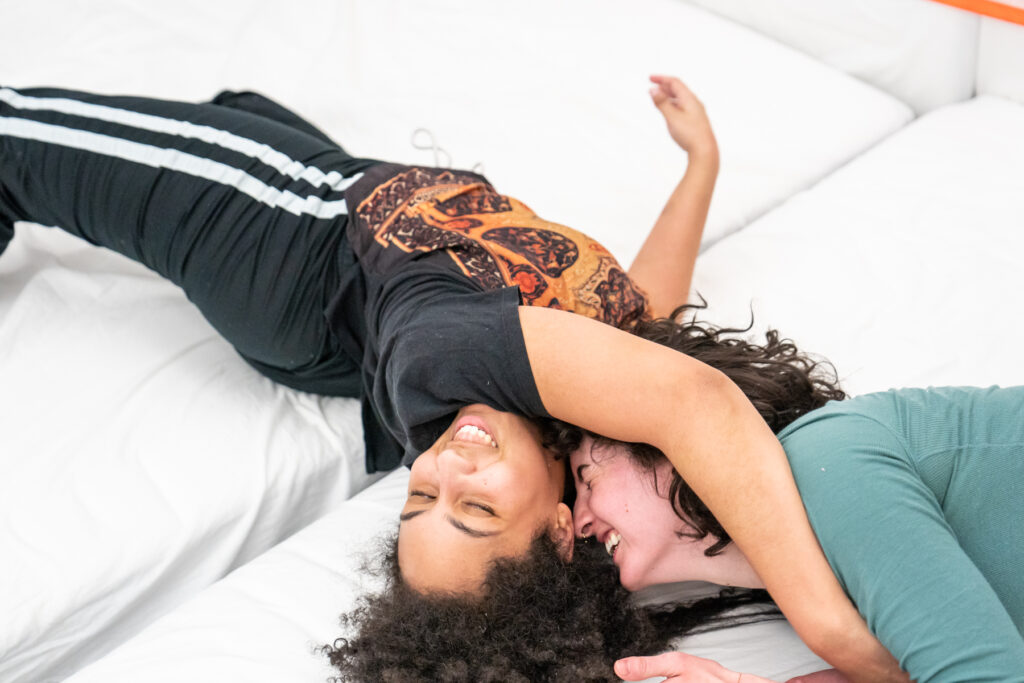
Nieya Amezquita and Sarah McCullough in rehearsal for Rock, Paper, Scissors. Photo: Bill Cameron. 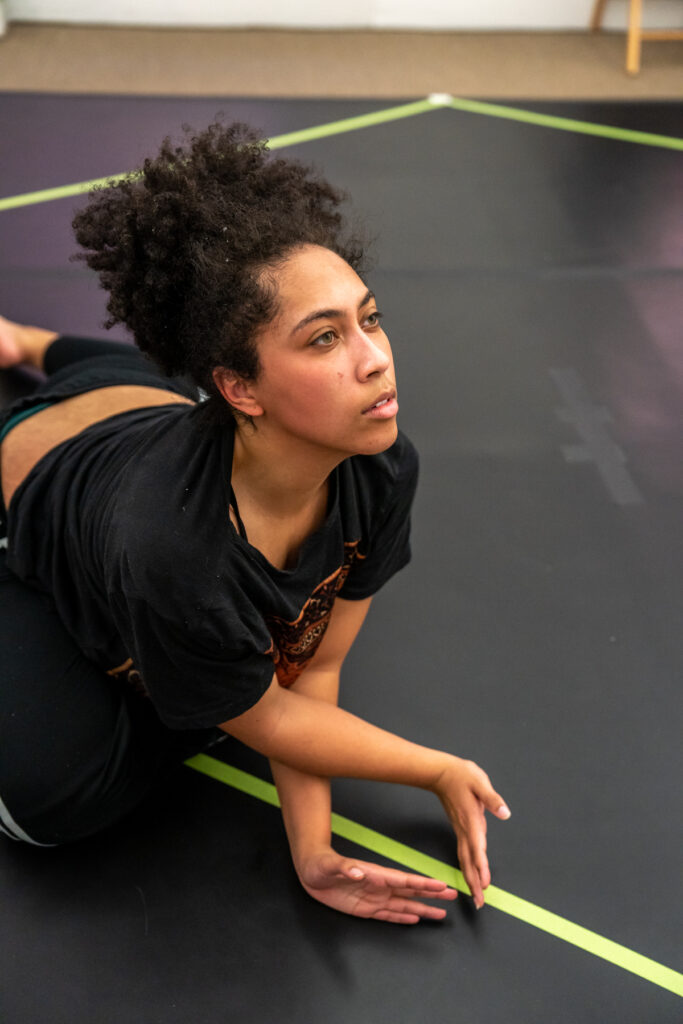
Nieya Amezquita in rehearsal for Rock, Paper, Scissors. Photo: Bill Cameron. 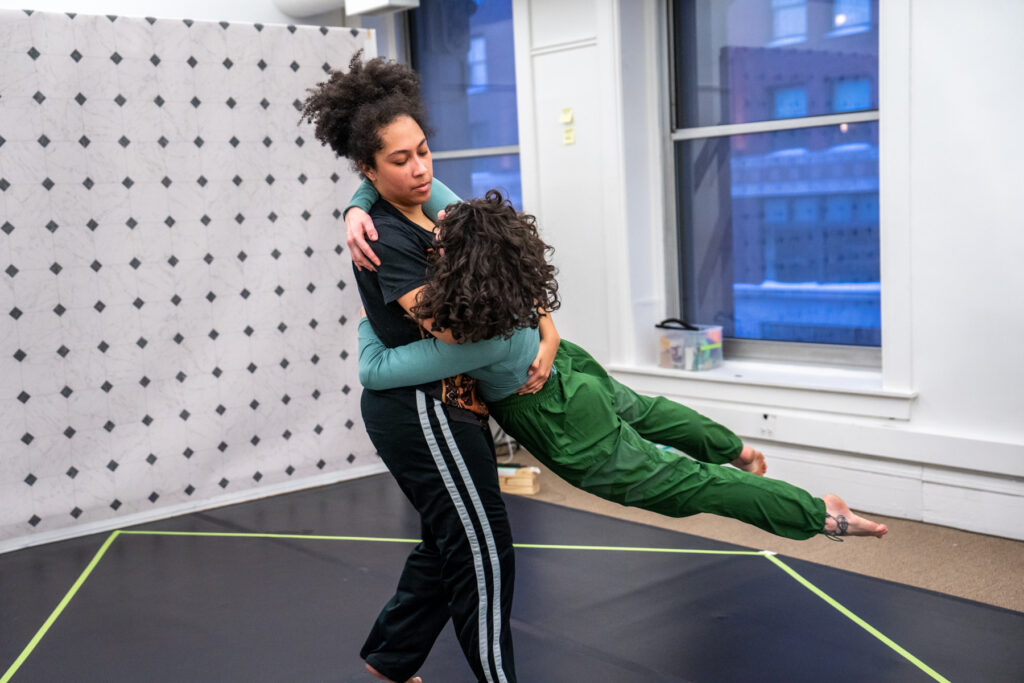
Nieya Amezquita and Sarah McCullough in rehearsal for Rock, Paper, Scissors. Photo: Bill Cameron. 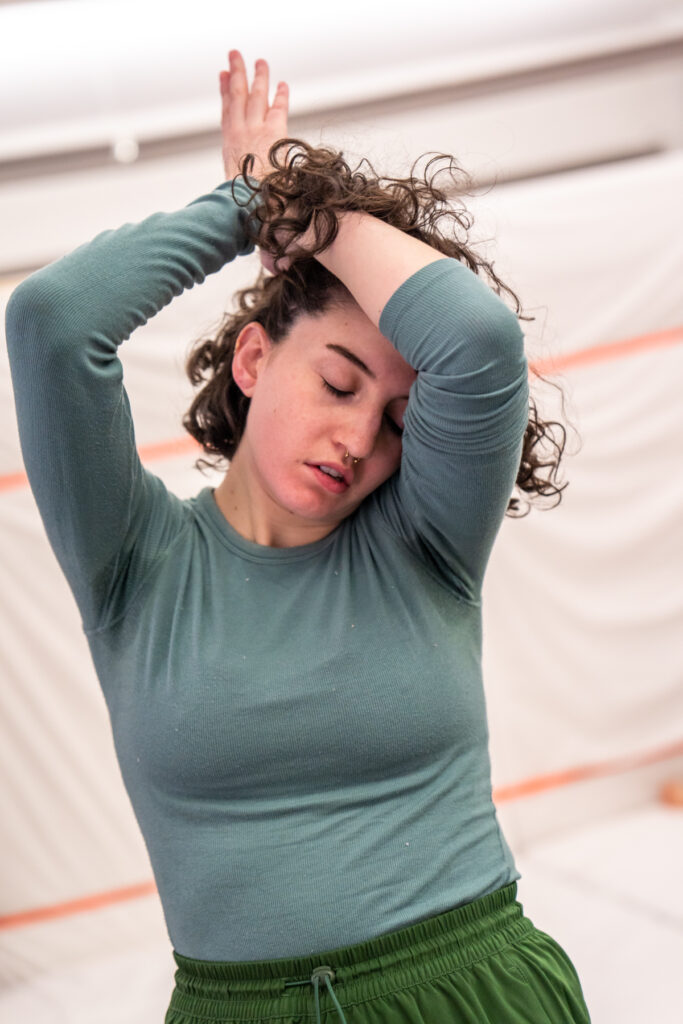
Sarah McCullough in rehearsal for Rock, Paper, Scissors. Photo: Bill Cameron.
ABI think there’s a couple things wrapped up in this. I started taking ballet classes when I was two and a half years old. To me, company life meant that I would be someone’s puppet. I idolized being abused. On some level, it has to do with who we’re conditioned to seek validation from, to prioritize attention from men. If all of your peers are women but it’s mostly men in leadership, unlearning that takes a lot of time. So permission is such an ingrained thing for me, but it’s been interesting to work with people that are not like that. I like to be surrounded by people who are smarter than me. Having women in my inner circle and in my internal creative space who have different relationships to that permission structure is helpful, because not everybody grew up in this internalized ballet structure.
MMRight. It’s not inherent to womanhood. A kind of thread I’m sensing between the question of identity and what you’re saying now is the idea that women can do anything. Which I think is the new way that we’re saying what we used to say, which was “A woman can do anything a man can do”—which was always so funny to me.
ABWhich also seems like a sister to “You can grow up and be anything you want to be.”
MMYes. Three prominent topics in the discourse™ are: (1) women can do anything; (2) an identification with trauma or a protectiveness of trauma; and (3) a need to define womanhood. Across political ideologies, there is such a desire to define what a woman is. Conservatives love to say, “They can’t even tell you what a woman is.” Which like, why? For me, if you’re asking that question, I think you have nefarious ends. But then I get mad when the response is, “A woman is anyone who identifies as a woman”, or, “A woman is anyone who knows what it is to X, Y, or Z.”
ABRight, who has experience with getting catcalled or something.
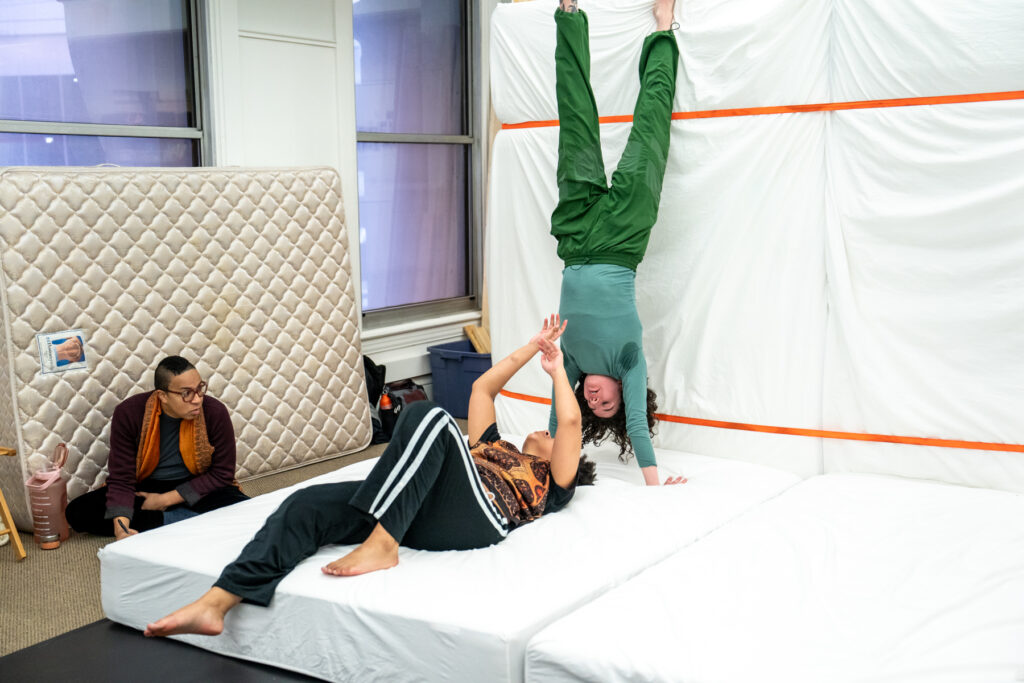
MMYeah. I reject the question. I reject the answer. I don’t want anything to do with any of it. To justify my being by naming my experiences, or by clinging to my trauma, is analogous with justifying my being by looking a certain way, or adhering to some biology that was defined by racist men. Do you feel at all attached to your trauma, or committed to it? Like a bad friend you can’t stop talking to.
ABThat’s an interesting question. It’s a part of me. I think that’s the hard thing—I would not be who I am if I hadn’t gone through those experiences. I think where I stand now is cool, because I know if I am averse to something because it is related to a bad experience, now I just either don’t want to interact with that thing, or I choose this other path. There’s two trains of thought in eating disorder recovery. One is, “It’s something you’re going to live with your whole life,” and then there’s other people who are just like, “No, that was a part of my life.”
MMVery that. Like the prevailing sentiment of, “I’m an addict forever,” which doesn’t seem to be working very well for recovery. In so many things, there’s this dichotomy of belief. “This is who you are, you’ll always be this, and it’s about learning to live with it,” or, “You were that, and now you’re something else.”
ABFor me, there’s no value in hiding or forgetting that aspect of it. There’s always something I can learn from that experience that I won’t learn until the time is right. In 10 years, I’ll be like, “Oh, I understand now.”
MMYes. There’s that line in Maddie Granlund‘s show: “Maybe I needed to see it 1000 times to figure it out.”
ABThat part of the show got me thinking so much. I’m the type of person who unpacks things slowly. If my goal is to be a better person then why am I putting a timetable on recovery from that experience? If I’m really going to let myself pass through phases of recovery and anger and letting go, then it’s going to be a shedding process. Maybe I’ll keep those skins in a box for a little while. Maybe I’ll forget some of them.
MMSomething I’m hearing is that maybe you’re protective of experience. I’m less protective of the experience, I think. There’s never going to be a squaring up of experience, or even an understanding. I’m a big believer in choice, though. I don’t believe that anyone is inherently this or that, or even that our experiences define us. I think that we choose, and then I think we justify those choices by pointing to whatever serves our chosen reality. But this is just my opinion. I think that all truth is time-based, or depends on a prevailing sentiment. We have way more agency than we want to believe. And so more culpability too, maybe.
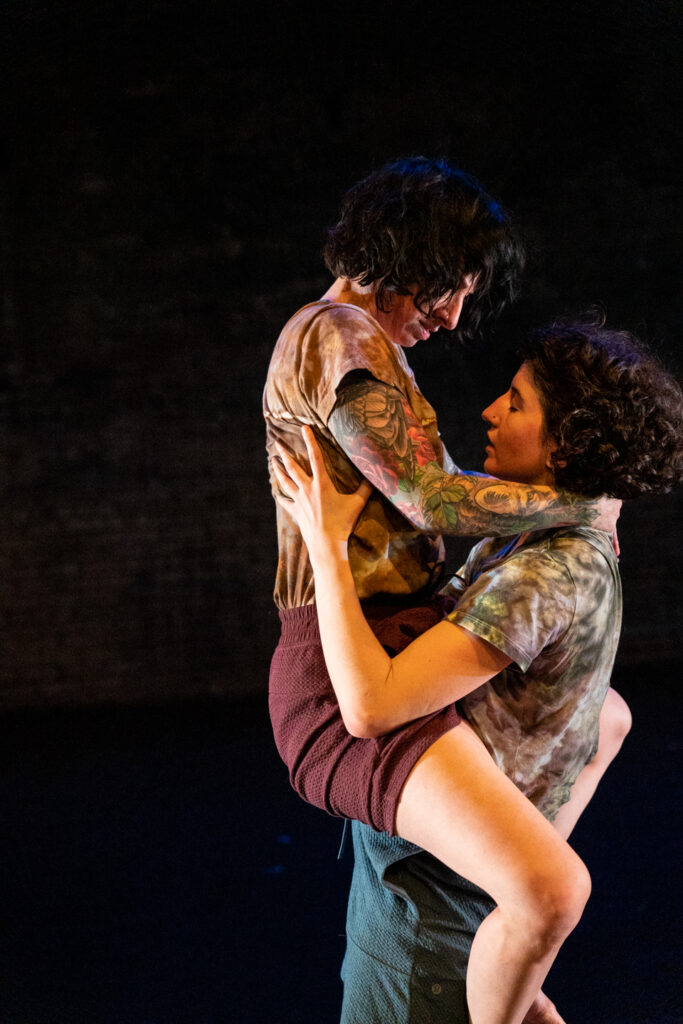
Lisa Berman and Sarah McCullough in showing of Rock, Paper, Scissors. Photo: Bill Cameron. 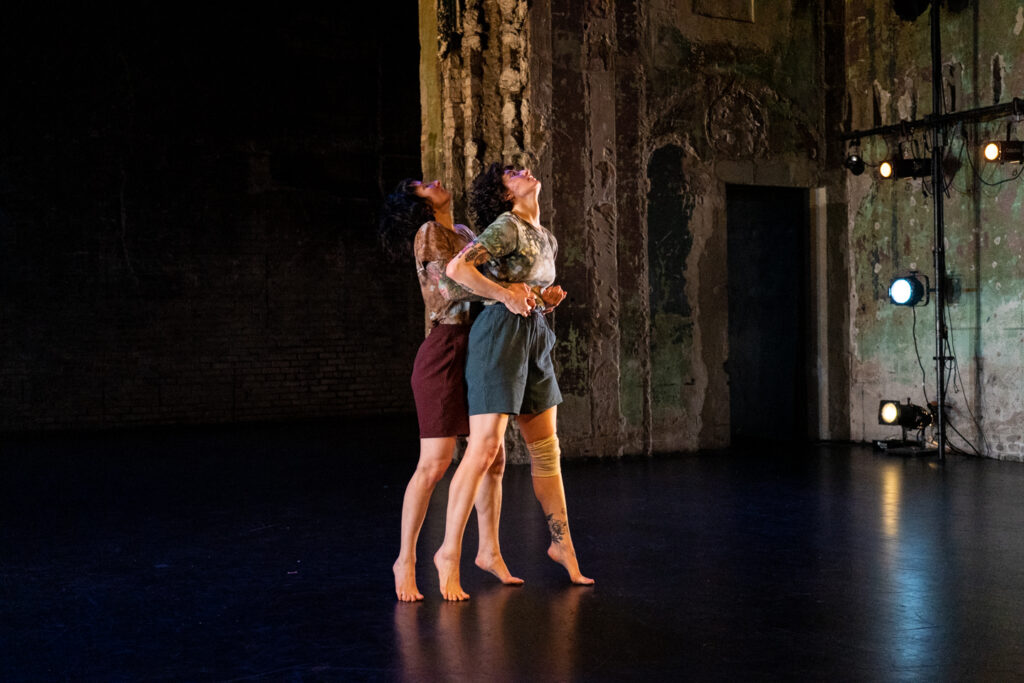
Lisa Berman and Sarah McCullough in showing of Rock, Paper, Scissors. Photo: Bill Cameron.
ABIt’s interesting, after our feedback session, I felt like I needed a little bit more of myself in the show, and to include not just the problems, but what I am proud of too. I feel grateful to Nieya Amezquita (one of the performers in the work) because she has reminded me that things totally don’t make sense, and yet, this is life. I feel proud that it’s not a piece that stays in one place, but that there is breadth in the material. For me, that means that it makes it feel—this is going to make you smile—but it feels truthful to life, in that it is not straightforward. And I’m okay with that.
MMWhy is that going to make me smile? Because I don’t believe in truth?
ABYeah.
MMWell, I believe in choice, and I believe that other people’s choice to believe in truth makes truth real for them. I’m very fluid, but I can be very staunch within that, which means I have to be very comfortable with disagreement and contradiction.
ABWhich is why I think we really get along.
MMOther people’s beliefs don’t have to square up with mine in order for me to believe them as true. Because, honey, if you’re feeling it, it’s happening. I can validate that without being a part of it. I can say, it’s not happening for me, but in no way does it not being true for me have anything to do with how true it is for you. Which I also think is why we get along so well.
ABI feel like we could talk forever. You help me think about things in a new way, but also you’re good at helping me understand my own vision.
MMThank you for saying that. That’s really important to me as a dramaturg, the balancing act of what I know as someone who has a really diverse toolkit. I see and hear your vision, and figure out what we’re going to do to successfully translate that to the people. And there are rules and there are conventions, and the choice to contend with them, or not, is even a convention.
ABBrandon Musser (artistic associate, sound designer), coming from a punk background, one of his bandmates always said, “You just need four walls and electricity.” In dance, you need a little bit more than that, but you can ask yourself: what are all the frills that you want, or are used to, and what do you actually need?
MMWhat’s critical?
ABYeah, what’s critical?
Rock, Paper, Scissors premieres at the Southern Theater March 17-19, 2023. >> more information
